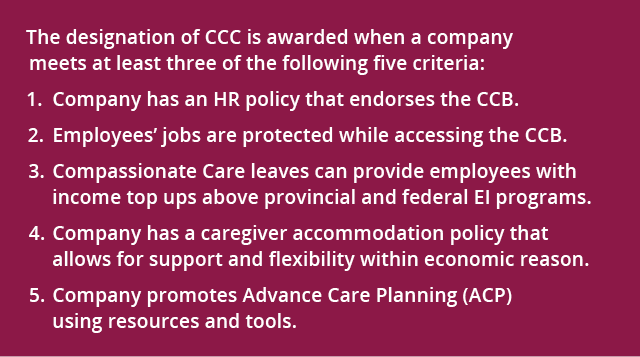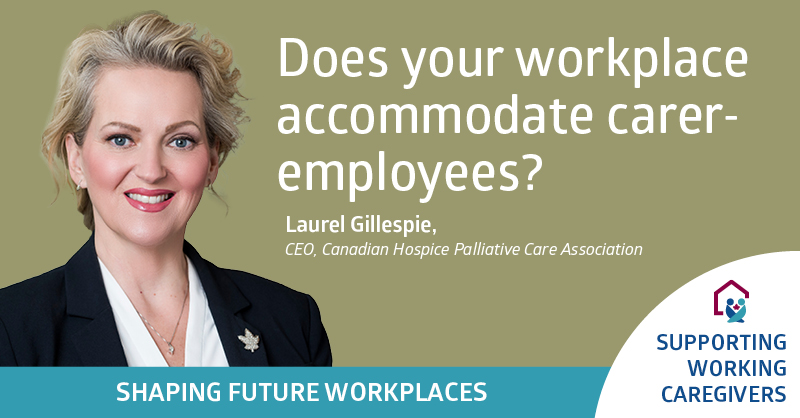Compassion at Work – The Evolution of Canadian Compassionate Companies
The Canadian Hospice Palliative Care Association’s Canadian Compassionate Companies program provides a potential solution to the growing challenge of supporting working caregivers.
The global pandemic and social and economic trends are changing the way people live and work. Thirty-five per cent of the total workforce is involved in caregiving, and if unsupported, these carer-employees are more likely to leave work. While research indicates that workplace accommodations improve company outcomes, carer-employees experience uneven access to workplace support. A lack of managerial awareness, care recognition, and work culture can restrict accommodations. Workplace stigma, such as the perception of carers as less committed to work, means people do not identify themselves as carers.
As part of a strategy to increase awareness of carer-employees who are entitled to the Compassionate Care Benefit[i] (CCB), the Canadian Hospice Palliative Care Association (CHPCA) established the Canadian Compassionate Companies (CCC) Program in 2013. The goal was to encourage the uptake of the CCB by corporate Canada. The program evolved to recognize companies that are supportive of carer-employees – individuals who are simultaneously employed and providing informal care for a family member.

In 2021, a study was undertaken, as part of the SSHRC/CIHR Healthy Productive Work Partnership Grant: Mobilizing the CSA Carer Standard[ii], to assess the impact of the CCC Program. The aim was to explore employer motivations to becoming a CCC-designated organization, to investigate the benefits and challenges associated with the CCC program, and to identify opportunities to expand the program.
Semi-structured interviews with four CCC organizations who held the designation for four years were conducted between February and April 2021. Two of the participating companies had 10 to 30 employees and two had 500 to 100,000 employees. Half of the organizations were unionized and together the participants represented local, provincial, and national scope.
The findings showed that organizations were motivated to achieve CCC designation as it improved awareness, helped to affirm the organization’s approach to care, and offered a way to build relationships with staff and the community.
The CCC designation was found to have intrinsic benefits, providing peace of mind among carer-employees and demonstrating the employer’s attention to employee wellbeing.
Through this study, opportunities to improve and expand the program were identified. CCC organizations expressed a desire for greater support and more consistent communication. They shared that expanded opportunities for knowledge sharing amongst CCC organizations would strengthen the program. Addressing these components would enable organizations to adopt a unified approach to program and policy development. With the demands from COVID-19 however, companies found it difficult to sustain the designation.
Overall, CCC employers indicated that the CCC program provides an excellent example of a workplace accommodation program that can generate benefits for both employees and employers. Although COVID-19 impacted the program, the CCC designation raised awareness of carer-employees and ensured that compassion and wellbeing were not forgotten in the workplace – topics of growing importance in today’s labour market.
Read the research brief.
References
[i] For more information see https://www.canada.ca/en/services/benefits/ei/caregiving.html
[ii] See: https://ghw.mcmaster.ca/projects/healthy-productive-work-partnership-grant/
ABOUT THE PROJECT
Carers Canada is leading the knowledge mobilization activities for a multi-sectorial research program to spread and scale a carer-friendly workplace standard, known as the Carer-Inclusive and Accommodating Organizations’ Standard (CSAB701-17). Led by Dr. Allison Williams, CIHR Research Chair in Gender, Work and Health at McMaster University, the research program consists of six inter-related sub-projects that will: increase awareness of the standard across Canada; evaluate readiness to change; determine feasibility and cost benefit; embrace cultural competency; consider Indigenous perspectives; and create an international standard. Visit PARTNERSHIP PROJECT SITE here

CIHR/SSHRC Healthy Productive Work Partnership Grant “Scaling up the Career Inclusive Accommodating Organizations Standard” FRN: HWP-146001 (CIHR); 890-2016-3018 (SSHRC).
 Laurel GillespieMarch 16, 2022
Laurel GillespieMarch 16, 2022

Compassion at Work – The Evolution of Canadian Compassionate Companies
The Canadian Hospice Palliative Care Association’s Canadian Compassionate Companies program provides a potential solution to the growing challenge of supporting working caregivers.
The global pandemic and social and economic trends are changing the way people live and work. Thirty-five per cent of the total workforce is involved in caregiving, and if unsupported, these carer-employees are more likely to leave work. While research indicates that workplace accommodations improve company outcomes, carer-employees experience uneven access to workplace support. A lack of managerial awareness, care recognition, and work culture can restrict accommodations. Workplace stigma, such as the perception of carers as less committed to work, means people do not identify themselves as carers.
As part of a strategy to increase awareness of carer-employees who are entitled to the Compassionate Care Benefit[i] (CCB), the Canadian Hospice Palliative Care Association (CHPCA) established the Canadian Compassionate Companies (CCC) Program in 2013. The goal was to encourage the uptake of the CCB by corporate Canada. The program evolved to recognize companies that are supportive of carer-employees – individuals who are simultaneously employed and providing informal care for a family member.

In 2021, a study was undertaken, as part of the SSHRC/CIHR Healthy Productive Work Partnership Grant: Mobilizing the CSA Carer Standard[ii], to assess the impact of the CCC Program. The aim was to explore employer motivations to becoming a CCC-designated organization, to investigate the benefits and challenges associated with the CCC program, and to identify opportunities to expand the program.
Semi-structured interviews with four CCC organizations who held the designation for four years were conducted between February and April 2021. Two of the participating companies had 10 to 30 employees and two had 500 to 100,000 employees. Half of the organizations were unionized and together the participants represented local, provincial, and national scope.
The findings showed that organizations were motivated to achieve CCC designation as it improved awareness, helped to affirm the organization’s approach to care, and offered a way to build relationships with staff and the community.
The CCC designation was found to have intrinsic benefits, providing peace of mind among carer-employees and demonstrating the employer’s attention to employee wellbeing.
Through this study, opportunities to improve and expand the program were identified. CCC organizations expressed a desire for greater support and more consistent communication. They shared that expanded opportunities for knowledge sharing amongst CCC organizations would strengthen the program. Addressing these components would enable organizations to adopt a unified approach to program and policy development. With the demands from COVID-19 however, companies found it difficult to sustain the designation.
Overall, CCC employers indicated that the CCC program provides an excellent example of a workplace accommodation program that can generate benefits for both employees and employers. Although COVID-19 impacted the program, the CCC designation raised awareness of carer-employees and ensured that compassion and wellbeing were not forgotten in the workplace – topics of growing importance in today’s labour market.
Read the research brief.
References
[1] For more information see https://www.canada.ca/en/services/benefits/ei/caregiving.html
[1] See: https://ghw.mcmaster.ca/projects/healthy-productive-work-partnership-grant/
Laurel Gillespie is the CEO of the Canadian Hospice Palliative Care Association (CHPCA), and previously held the position of Director, Advance Care Planning at CHPCA. She holds a Master of Business Administration and is a Certified Health Executive (CHE) through the Canadian College of Health Leaders (CCHL). Laurel sat on the Board of Autism Canada for 7 years. Laurel has numerous years of experience at the Ottawa Hospital Cancer Centre and at the House of Commons supporting Members of Parliament and was nominated for consideration as a Senator in the Canadian Parliament for her good works.
FAVORITE PASTIME: In her free time, Laurel enjoys spending quality time with her family and exploring the Gatineau hills with the family dog, Wynter.
Instagram: @cdnhpcassn
Facebook: @CanadianHospicePalliativeCare
LinkedIn: https://www.linkedin.com/in/laurel-gillespie-mba/
Twitter: @LaurelGillesp15
ABOUT THE PROJECT
Carers Canada is leading the knowledge mobilization activities for a multi-sectorial research program to spread and scale a carer-friendly workplace standard, known as the Carer-Inclusive and Accommodating Organizations’ Standard (CSAB701-17). Led by Dr. Allison Williams, CIHR Research Chair in Gender, Work and Health at McMaster University, the research program consists of six inter-related sub-projects that will: increase awareness of the standard across Canada; evaluate readiness to change; determine feasibility and cost benefit; embrace cultural competency; consider Indigenous perspectives; and create an international standard. Visit PARTNERSHIP PROJECT SITE here

CIHR/SSHRC Healthy Productive Work Partnership Grant “Scaling up the Career Inclusive Accommodating Organizations Standard” FRN: HWP-146001 (CIHR); 890-2016-3018 (SSHRC).